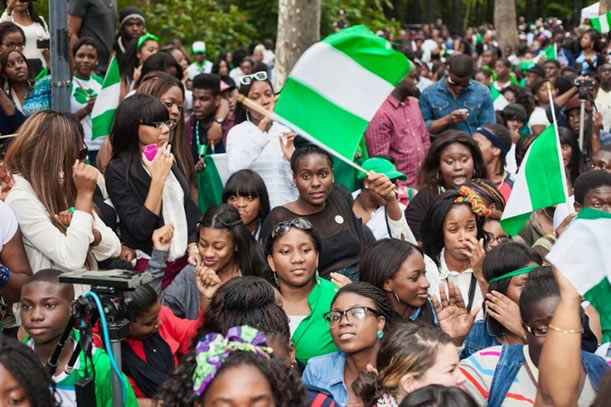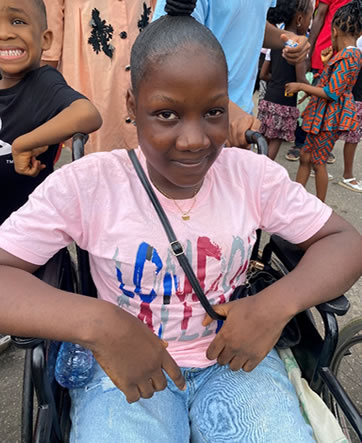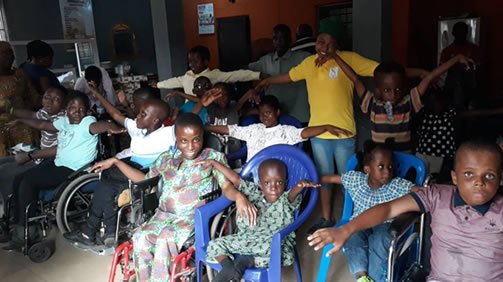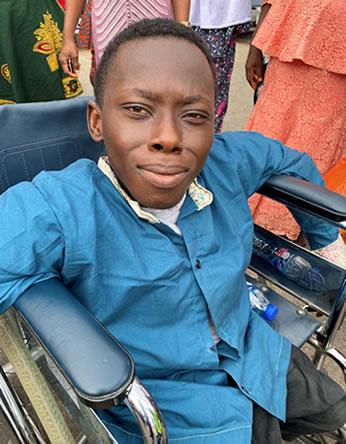Worldwide, August 12 is recognized and celebrated annually as an International Youth Day. In Nigeria, the average Nigerian youth can be attributed to several characteristics but what strikes mind is the ‘uncertainty’ in life.
The fact that the Nigerian environment do not give youths hope that they will surmount challenges or obstacles faced in life. For the Nigerian youths having disabilities, this is an entirely different ball game. It is no longer about the feeling of ‘uncertainty’ but the acceptance that they have no place or footing in the Nigerian society – that they are left behind.
The United Nations has defined youth as person between the age of 15-24 years. While the median age for youths in Nigeria is 18 years, it is generally acceptable that youth is a stage of transition from childhood to adulthood. This transition comes with several life changes and challenges for the Nigerian youths with disabilities. Attaining education, good health, means of livelihood, social inclusion and general good standards of living are some of the hurdles to cross for these vulnerable youths.
Nigeria State of Youths with Disabilities
In the Nigerian history of bridging the gap between people with disabilities and achieving disability inclusive development, progress is significantly slow. Enactment and implementation of disability laws at the national and state levels remains a daunting task. After intensified and prolonged efforts by activists, non-government organizations and other stakeholders, President Buhari, in 2019 assented to the Discrimination Against Persons with Disabilities (Prohibition) Act for persons with disabilities in Nigeria. Although this is a major milestone, domestication of the Act in all Nigerian States remains far-fetched. Nigerian youths having disabilities are left behind in access to education, discriminated from achieving good health and wellbeing, excluded from social inclusion, and are often impeded from exercising their fundamental human rights. Unfortunately, this situation is found to be in contrast with the theme of the August 12, 2022 International Youth Day.
Creating A Nigeria for All Ages
Inter generational Solidarity: Creating A World for All Ages’ is the theme for the August 2022 International Youth Day. In the simple words of the UN Secretary-General António Guterres, the theme calls for action ‘to join hands across generations to break down barriers, and work as one to achieve a more equitable, just and inclusive world for all people’. This has made the writer reflect on how the generations of Nigeria’s past leadership could have spurred Nigeria into the category of developed countries because the common thing found in these developed countries were their government’s commitment and continuous efforts to realize inclusive developed nations for their citizens (disabled and non-disabled persons alike), and yet there is more uncertainty for the average Nigerian youth with disability. However, every cloud has a silver lining. This is evident from the Global Disability Youth Summit event in February 2022.
Global Disability Youth Summit and Lessons for Nigeria
The 2022 Global Disability Youth Summit was an historic event which affirmed commitment to ensure inclusion of youths with disabilities at the global, regional, and national levels in line with the Convention on the Rights of Persons with Disabilities (CRPD), and the 2030 Agenda of Sustainable Development Goals. By the end of the summit, 16 actions were identified and recommended for any government committed to promoting participation of youths with disabilities at all levels, and ultimately achieve the CRPD and Agenda 2030.
Action 1 – Increase decent work and easing employment opportunities
Action 2 – Make technology and assistive devices accessible, gender- and age-sensitive
Action 3 – Facilitate awareness-raising on disability rights, inclusion and human rights-based approaches to youth with disabilities
Action 4 – Ensure access to information, communications and services for all
Action 5 – Access the right to recreation and support sustainable friendships
Action 6 – Address the effects of climate change
Action 7 – Make humanitarian action inclusive
Action 8 – Ensure quality, inclusive education for everyone
Action 9 – Include all youth with disabilities, of all genders, through an intersectional approach
Action 10 – Promote independent living and inclusion of all in communities
Action 11 – Promote disaggregated data on youth with disabilities
Action 12 – Engage youth with disabilities in decision-making processes
Action 13 – Enhance participation in political and public life
Action 14 – Ensure representation in United Nations monitoring mechanisms
Action 15 – Ensure equal access to social protection
Action 16 – Ensure equal access to healthcare
Role of Festus Fajemilo Foundation (FFF)
FFF recognizes youths as an integral part of bringing about sustainable development for any country. As such, FFF is committed to realizing disability inclusive development (DID) across the 36 states in Nigeria. Adept at the use of the community-based rehabilitation model to achieve DID, the organization is well positioned to contribute to creating a Nigeria for all ages and leaving no youth with disability behind. By the end of year 2025, a decade would end since when the 2030 Agenda came to force. What will be the state of the Nigerian youths with disabilities?
On a final note, FFF congratulates Nigerian youths with disabilities on the International Youth Day.
Yunus Dosunmu
Project Officer, Festus Fajemilo Foundation.




